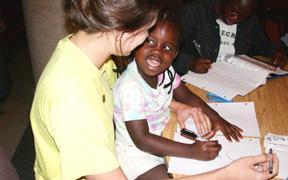Safa Perusi travels every Monday from her Baton Rouge home with bars on its windows, no central air conditioning and a broken screen door to the stained glass windows and polished floors of LSU’s Christ the King Catholic Church.
She is tutored there by University students, all of whom speak English more proficiently than her 13 family members.
Perusi and almost 40 other refugees are tutored every Monday and Tuesday by volunteers from CTK’s Faith, Peace and Justice committee.
The refugee and immigrant department of Catholic Community Services helped connect the committee with the young refugees.
“We’ve been doing this for four years,” said Joey Hartzog, leader of FPJ.
Many of the children seem to be improving only by a small margin, said Nichole Morales, a religious studies sophomore and coordinator of the tutoring program.
“I think the language hinders them,” she said. “They aren’t getting the instruction in their homes that most of us got. Everything we learned growing up about language and culture, they are learning in a classroom.”
The children who go to CTK Monday and Tuesday nights range in age from 4 to 13 and attend various schools around Baton Rouge, where they are taught in “English as a Second language” classes with other immigrant and refugee children. Most are from Sudan – only a few of the youngest were born in America. They are all skinny, with skin the color of charcoal.
When they arrive at CTK, they run into the arms of students and braid their hair, do cartwheels, sing and dance – almost anything to play with each other and the volunteers.
“They were nothing like this when we started this year,” she said.
The children were hesitant to warm up to volunteers, and they would repeatedly call themselves stupid, Morales said.
“We just showed them love,” she said. “And now, look at them.”
It takes Morales and the other volunteers almost ten minutes to get the children seated at the small round tables in the CTK activity center.
And then the tutoring begins.
Natalie Ross, a graphic design sophomore, tutors seven-year-old Conner, who struggles with words like “sounds” and “silly.” She sounds the words out with him and praises him when he pronounces contractions correctly.
“I feel like I’m really doing something here,” she said.
Morales tutors Safa in science. In between the work, Safa shows Morales dances she has been working on at school. When Morales protests that the homework must get done, Safa sits down and replies, “We can find these answers so easy.”
Morales said Safa is one of the smart ones.
“But there are others who struggle just to add and read the simplest words,” she said. “I really think it depends on their parents.”
Anite Para is one of the children who excels. While she is finishing her homework, she reaches across a table to help a friend with math.
Para’s father attended a university in Egypt.
While the older students finish homework, the younger students color and sing.
When seven-year-old Ashan Barnaba finishes her homework, she pencils cards for all the volunteers.
“It can be hard sometimes, at school,” Barnaba said. “This makes it easier.”
Eventually, all the children finish and begin to run around, to fix each other’s hair, to dance – until Morales calls them into a circle for the ending prayer.
One of the children always leads the prayer. They usually pray to do well in school.
When she brings Safa home, Morales sits in the living room of the Perusi house. Safa asks Nichole about college, because she wants to go, too.
“They’re coming here and seeing the importance of learning,” Morales said. “We’re exposing them to goodness.”
Volunteers offer tutoring to refugees
October 22, 2003

Volunteers offer tutoring to refugees



